This is a note to organizers. Your role in getting a speaker ready to talk is as important as the speaker’s own preparation.
In the last post about the “What If” event, there was a fatal flaw on behalf of the organizers. I thought I’d illuminate our top three forget-me-nots that every organizer needs to know.
1. A biography is not an introduction. Speakers think that organizers will adapt a bio to be appropriate for the event. Organizers are too busy to notice what is sent to them needs adjusting. Introductions are critical to setting the tone for the speaker’s talk and the event overall. Last week Richard Saul Wurman (founder of TED) opined on this topic at TEDx in New York- he claimed the more important the person, the shorter the intro. As in “Now just let me introduce you to…Cher.” Truly, people with notoriety need little introduction. Something to keep in mind when writing- or reading an intro.
2. Watch the time. Closely. Get a clock and a big piece of paper with “5″ on it- to give them the 5 minute warning. If the speech is only 5 minutes, then make that sign a “1.” Whatever the trigger, make it clear to the speaker and make good on the threat to pull them off at their appointed time. If you don’t, you end up breaking a promise to your audience and likely messing up the entire event. Last night at a live event with Diane Keaton, they had to start a bit late because of traffic but they came darn close to finishing at their published time. I noted and appreciated that.
3. Don’t be afraid to ask for slides in advance. Okay, you can ask and they may ignore. You can ask and they may deliver them the day before. But if you set the expectation that slides are to be supportive and not THE TALK then you can request them in time to review and make sure that they can be read, are relevant and can play (if video is involved). If the speaker shows up to the talk with slides you’ve never seen, then you own the problem if they don’t work.
This is all assuming that you have discussed and negotiated the real essence of the speaker’s talk. A speaker can never have enough information about the audience, setting, agenda, order and overall goal for the event.

